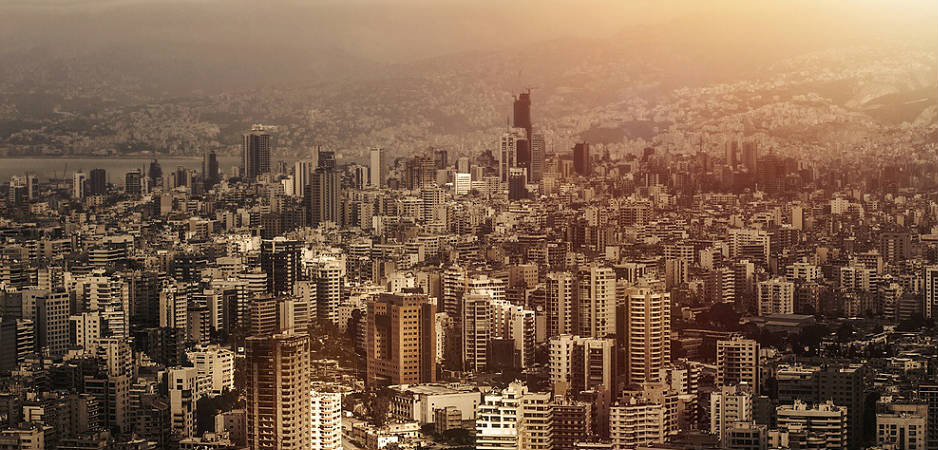The armed conflict between the Lebanese Army and Islamist militants has revealed Lebanon’s political instability.
The term “hostage crisis” is generally associated with the 444-day hostage detention in the US Embassy in Iran between 1979-80. But today, the media in Lebanon uses the same term to refer to an entirely different crisis in this Middle Eastern country. During a five-day conflict in the first week of August, more than 20 Lebanese soldiers and Internal Security Forces (ISF) were abducted in Arsal, a small town on the border with Syria.
One month later, Lebanon’s hostage crisis — another sign of the spillover of the Syrian Civil War — reached its climax. At that time, the Islamic State (IS) beheaded two abducted Lebanese soldiers, uploaded videos of the beheadings on social media and sent back one of the bodies to Lebanon.
International media reported on the fighting in Arsal that led to the abduction, but its aftermath and the ongoing crisis in Lebanon have not received enough attention. However, this crisis, which has its roots beyond the recent territorial advances of Islamist groups into the country, has affected Lebanon’s political and social scene in two major ways. First, the Lebanese intensified pressure on their politicians to find a solution to the crisis, which is happening amid a power vacuum in the country. Second, there have been increasing attacks on Syrian refugees. It is vital to understand the current situation in Lebanon in its proper context.
Arsal Crisis
The Arsal crisis started on August 2, after Lebanese soldiers arrested Imad Ahmed Jumaa, the commander of a Syrian rebel group affiliated with the al-Qaeda-linked al-Nusra Front. In response, militants from IS and al-Nusra Front attacked and seized the northeastern border town of Arsal, which is home to thousands of Syrian refugees.
At least 17 Lebanese soldiers and 42 civilians were killed in the fighting in and around Arsal, and Lebanese security sources reported dozens of fatalities among the militants. After five days of fighting, with the mediation of Sunni clerics, both sides reached a ceasefire. When militants withdrew from the town, they took more than 20 Lebanese soldiers and security force members hostage.
Five soldiers were freed from captivity after the end of conflict. But in mid-August, the militants announced they would not free any more hostages until their members imprisoned in Lebanon were released. They beheaded the first Lebanese soldier on August 28 to put more pressure on the government in Beirut.
Power Vacuum and Hostage Crisis in Lebanon
The hostage situation also highlights Lebanon’s months-long political crisis. Mourners at the funeral of a soldier executed by IS accused the government of failure in the negotiation process. His family called on the Lebanese to revolt until the release of remaining soldiers in captivity.
During the first week of September, people demonstrated in several cities in solidarity with the family of the beheaded soldier. Relatives of other abducted soldiers also protested in different places and demanded the government to save their sons. They even appealed to the army to exchange all the Lebanese ministers with the soldiers in captivity.
The security dilemma in Lebanon could potentially lead to more sectarian division in the country. Given this situation, many people who think the army cannot protect them are now arming themselves.
The presidential vacuum means his power has been shifted to the cabinet of Prime Minister Tammam Salam. In the long term, this could lead to a disruption of the power balance between the different sects in Lebanon. This power balance was already delicate before the end of Suleiman’s term. Because of these concerns and the looming terrorist threat, the UN Secretary General Ban Ki-moon urged political leaders to elect a new president as soon as possible and put an end to the divisions.
Security concerns and the threat of terrorist activities are other consequences of this power vacuum. Gunfire exchange in Sidon’s Ain al-Hilweh Palestinian refugee camp, the attack on Lebanese soldiers in Tripoli and the recent assault of Islamist militants on Arsal have shown how fragile the security situation has become in the last months.
The security dilemma in Lebanon could potentially lead to more sectarian division in the country. Given this situation, many people who think the army cannot protect them are now arming themselves. For the first time since the Lebanese civil war ended in 1990, Christian communities, who are afraid of Islamist militants’ assaults, are rearming themselves.
As the result of these concerns, politicians, including former Lebanese prime minister and head of the political Future Movement Saad Hariri, asked the relatives of captured soldiers to support the government and its decisions. Additionally, Lebanon’s The Daily Star newspaper on September 6 urged the soldiers’ relatives not to put all the blame on the authorities. The newspaper’s editorial also insisted that the family’s sit-ins and protests would create more “divisions between the people and the state.”
But on the same day, the beheading of a second soldier led to more protests in several cities. The protesters also blocked one of the roads to Beirut’s international airport. Several pictures uploaded on social media showed the chaos and anger that ensued after the news.
Syrian Refugees Under Attack
This time, groups of Lebanese did not just target their own politicians, but also Syrian refugees: They torched tent camps in Beirut’s southern suburb neighborhood of al-Lailaki. More than 1 million Syrian refugees are currently living in Lebanon. This means the population of Syrians in Lebanon is almost equal to a quarter of the resident population. According to UN data, after the beginning of the war in Syria, Lebanon has become the country with the highest per capita concentration of refugees worldwide.
Even before the current hostage crisis, Syrian refugees faced problems in Lebanon. Syrian children cannot study in the host country’s education system, and socioeconomic hurdles have pushed some of them to beg in the streets. Even the health care system is not always welcoming of the refugees. In one incident, a Syrian woman gave birth in the street because hospitals did not accept her.
In the towns of Hosh al-Ghanam and Riyak, Syrians relocated their camps after townsmen warned them to evacuate the region. Refugees in Houla and Burj al-Shemali also received written warnings to leave their tents and were expelled by locals. Syrian refugees have been accused of being related to the Syrian militants who beheaded the two Lebanese soldiers.
These tensions can not only result in a humanitarian crisis for Syrian refugees, but can also pose a potential threat for the Lebanese population. If these refugees are radicalized in response to the discrimination against them, Lebanon’s security dilemma will get worse. This country has experienced a similar situation before the start of the civil war in 1975. In the years leading up to the war, the Palestinian refugees in Lebanon were militarized because of their situation in Jordan and the Occupied Territories.
So far, politicians and international organizations have tried to calm the tensions. But this is not an easy task in this environment, in which most Lebanese struggle with economic issues: An estimated 25% of the population in 2013 lived on less than $4 a day. Adding to the problem, the less developed regions of Lebanon are located near the Syrian border. These are the same places where most of the refugee camps have been set up. Many Lebanese now see Syrians as the main reason for their poverty and economic problems.
The Arsal conflict was the first time that militants from Syria have attacked and seized a town inside Lebanon. IS and al-Nusra Front are not a distant enemy anymore.
Memories from the Lebanon Civil War (1975-1990) are another cause that fuels the tension between the citizens of these two neighboring countries. The heavy presence of Syrian army and their infamous intelligence service on the ground in Lebanon is not something that the Lebanese forget easily. The Syrian army only withdrew from Lebanon in 2005, after the assassination of former Lebanese Prime Minister Rafik Hariri, due to the alleged Syrian involvement in his death.
Winter Time Ahead
At the moment it remains unclear how the hostage crisis will end. But the effects of this crisis on Lebanon are obvious. The Arsal conflict was the first time that militants from Syria have attacked and seized a town inside Lebanon. IS and al-Nusra Front are not a distant enemy anymore. IS presence in Syria not only threatens border towns in Lebanon, but is also a danger for this country’s fragile unity and internal security. In January, a man from the northern city of Tripoli uploaded a video to YouTube in which he announced the creation of a Lebanese branch of IS.
On September 9, the Lebanese army started a new operation in Arsal and its rural neighborhoods. The main object of this operation was to cut the supply lines of militants. However, this does not mean that the border and the no-man’s-land between Lebanon and Syria will be safer in the future. Some military strategists suggest that this operation will lead to more conflict in the border region. A Lebanese army source stated that after the new army operation and with wintertime approaching, militants “will carry out more attacks.”
The Arsal battle is the latest in a series of bombings and armed confrontations that started in Lebanon last year. In late May 2013, violence erupted in Tripoli between supporters of the Syrian regime and backers of the uprising against President Bashar al-Assad. Eighteen civilians died during the one-week armed struggle. Abra in southern Lebanon was the scene of another conflict between the Lebanese army and supporters of an anti-Hezbollah preacher. Car bombings and suicide attacks in Beirut also brought tension to the capital.
During the last few weeks, Lebanese have been organizing demonstrations to show their anger about the prolonged presidential vacuum, instability and the uncertain destiny of the abducted soldiers. The presence of Islamist militants, the hostage crisis, Syrian refugees and the power vacuum in Lebanon are the main reasons why many Lebanese see themselves on the edge of another major conflict after the 15-year-long civil war.
The views expressed in this article are the author’s own and do not necessarily reflect Fair Observer’s editorial policy.
Anna Omelchenko / Shutterstock
Support Fair Observer
We rely on your support for our independence, diversity and quality.
For more than 10 years, Fair Observer has been free, fair and independent. No billionaire owns us, no advertisers control us. We are a reader-supported nonprofit. Unlike many other publications, we keep our content free for readers regardless of where they live or whether they can afford to pay. We have no paywalls and no ads.
In the post-truth era of fake news, echo chambers and filter bubbles, we publish a plurality of perspectives from around the world. Anyone can publish with us, but everyone goes through a rigorous editorial process. So, you get fact-checked, well-reasoned content instead of noise.
We publish 2,500+ voices from 90+ countries. We also conduct education and training programs
on subjects ranging from digital media and journalism to writing and critical thinking. This
doesn’t come cheap. Servers, editors, trainers and web developers cost
money.
Please consider supporting us on a regular basis as a recurring donor or a
sustaining member.
Will you support FO’s journalism?
We rely on your support for our independence, diversity and quality.







Comment